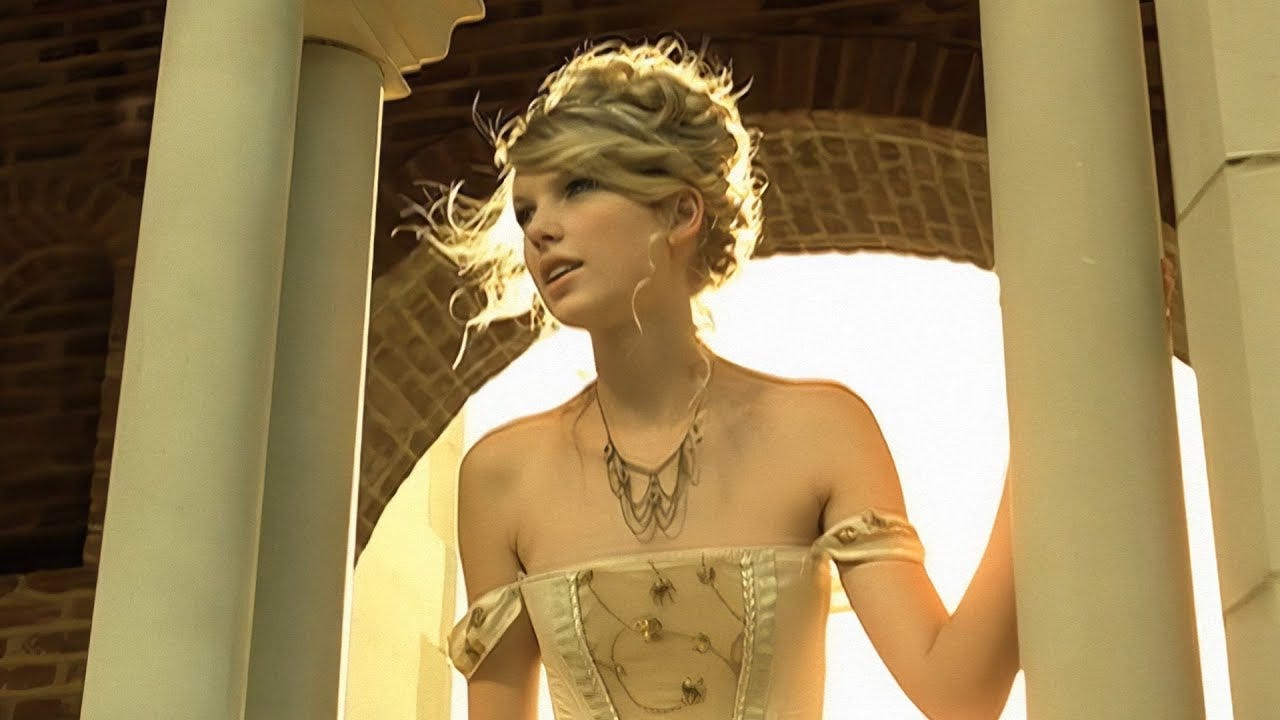Guest post: The Romantic Swifties
06-28-2024
Guest post: The Romantic SwiftiesLois McLatchie Miller on the millennials longing for Taylor's "happy ever after"
The Girl Boss can’t come to the phone right now. Why? Because she’s dead. Shakespearean experts have lauded her lyricism as comparable to the great Bard himself. Critics turn their nose up at the “over-rated” hype. But as Taylor Swift’s “Era’s Tour” engulfs the UK, anyone seeking to understand the inner workings of an entire generation of disillusioned female thinkers – and voters – ought to set aside snobbish prejudice, and dive into Swift’s two decade-expression of the 21st century female experience. Swift’s career began at the tender age of 15. Her earliest albums, dating back to 2006, depict high school crushes – giving way to the romantic hope of her future. “Romeo” would sweep her off her feet, and they’d dance fearlessly in the rain. Her songs are made of the stuff that little girls dream of. But as Taylor aged, we - the innumerable millennial cohort who had employed Taylor’s music as the soundtrack to our noughties high school heartbreaks - did too. In “1989” (2014) and “Reputation” (2017), her age-adjacent fanbase passed through university and discovered young adulthood – and a feisty feminism. Swift’s work both shaped and reflected reality. Records like “Blank Space” and “...Ready for it?” heralded a generation purportedly free from commitment, proud of their self-indulgence, revelling in notoriety. The mid-twenties Swift redefined the romanticism of her younger “Love Story” themes, declaring us a generation of “New Romantics”. “We’re too busy dancing, to get knocked off our feet!” we chorused. “Welcome to New York” had us believing we were Carrie Bradshaw, ready to bulldoze our way to boardrooms with a trail of past finance-bro love affairs in our wake. We embarked on the path that the sexual revolution had laid bare – throwing off traditional hopes of love and marriage in favour of boardroom ambition and party pursuits. We dismissed our early hopes of Romeo as a dated myth – Prince Charming as an out-of-touch legend. We were the “boss babes”; and Swift was our CEO. Somehow, the average British politician still believes that our generation of women are stuck in their “1989 era”. The archetypal woman is believed to prioritise being fun, fabulous and free – and perpetually 22. Our latest government’s appeals to women assumed this mould, with female-focused policies giving no incentives towards marriage and family. Instead, headline offerings have been limited to removing safeguards from accessing hormonal contraception – and outsourcing childcare to push women back into the career-obsessing rat race as soon as possible after birth. But we aren’t 22 anymore – and neither is Taylor. The promises of girl-bossery have started to wear thin. A commitment-free model of womanhood has coincided with an epidemic of loneliness. A third of UK homes are now single-adult households. Half of women don’t have kids before they’re thirty, and the marriage rate is at an all time low. For those who truly prefer solitude, that’s great. But for many, loneliness is a cultural circumstance, not a choice. It’s little wonder a study out of Yale University found that women’s happiness has decreased in both relative and absolute terms since the 1970s. Moving into her thirties, Swift has mirrored a seismic shift in the expectations, desires, hopes, and dreams of the generation around her. While the world continued to dish out hard-faced consumerist girl-bossery, Swift veered in a different direction - a return to story, myth, legend. Her Folklore/Evermore albums deliver an enchanted forest aesthetic, with a focus on narrative exuding something unseen in the by the machine of cookie-cutter feminist cultural production. Beauty. Indeed, we’ve seen this show before. Following the brutal realism of the enlightenment period of old, the romanticist pioneers of the 1800s pushed back against the age of bare reason and industrial revolution; re-enchanting the world with soul-touching folkloric art, drawing inspiration from medieval chivalry and yearning for emotional nourishment. Emerging from the bare-reason season of the New Aetheist moment, young millennials too crave spiritual reawakening. Our desire for narrative over naked fact has meant that 2 in 5 of us now use TikTok as our primary search engine for information, rather than Google. Our thumbs ache with scrolling through the revolving storylines of “tradwives” and “cottage core” influencers. We want love back. On a survey conducted by Matchmaking website PlentyOfFish, over half of singles now think one-night-stands are a thing of the past. And we want to re-encounter the divine. We’re returning to traditionalist churches in droves. We want re-enchantment, and Swift is our enchantress. How was Swift so in touch with this reality? Human experience. Her well-documented relationship with Londoner Joe Alwynn put the values of 1989’s feminism to the test. The couple co-habitated without any longterm marriage commitment – something Taylor tried to assert her contentment with in her hit “Lavander Haze” (disavowing the “1950s sh*t they want from me”). But in the “Tortured Poets Department” album released this Spring, Taylor finally breaks down the feminist lies she has been surrounded with. Her break-up ballad for Alwynn “So Long London” reveals the anxiety of a non-committal long-term relationship: “You swore that you loved me, but where were the clues? I died on the altar waitin’ for the proof”. Verse upon verse of her anthology depicts a craving for marriage – and an anger at the men who were too weak to commit to her. While in 2014 (“New Romantics”), she begged “please leave me stranded, it’s so romantic”; in 2024, (“Down Bad”) a seasoned woman of experience chastised her lover: “How dare you think it’s romantic, leaving me safe and stranded?”. Her “New Romantic” antics have given way to New Romanticism. Swift is clear that the satisfaction of a glittering career is no match for a loving relationship. On “I can do it with a broken heart”, she depicts the irony of being a joyful prop on a stage, while devasted in her personal life: “All the pieces of me shattered as the crowd was chanting, "More!". Elsewhere on the latest album, presumably referring to her six years with Alwynn, she bitterly recounts the investment she made for him to simply break off: “I’m pissed off you let me give you all that youth for free.” In throwing off the significance of marriage as an old wives’ tale, feminism has played a dirty hand to millennial women. As the demand for cheapened sexual encounters has grown as a cultural norm, the protection and commitment once sealed by a trip to the altar now has no guarantee. Both men and women miss out on the stabilising impact that a marriage can bring. So many of us are done with girl-bossery. We want our Love Story back. But a society which has disregarded romance as a “myth” has been left somewhat devoid of “meet-cutes”. Decades of men have been taught that women have no need for them, and behaviour has deteriorated in accordance. As women resort to swiping through catalogues of partners on plastic screens, they find that neither the red pill bros nor the beta boys are offering the “happy ever after” they want to return to. A cult-like obsession into Taylor’s relationship with footballer Travis Kelce has kept the female magazine industry in business this year. The obsession in Taylor’s “story” is perhaps an attempt, for many, to fill a void. Believing that a love story can still play out on the world stage offers a token of hope that one can be the main character in a similar real-life story. Swift’s generation was given a raw deal. But the weight of her influence on the GenZ girls coming up behind us could help direct them on a different path. Her story of triumph over the girlboss trope could have an impact in recultivating the value of marriage, and reshaping expectations for relationships from an earlier stage of life. Let’s hope for her happy ending. It might inspire many more. Invite your friends and earn rewardsIf you enjoy Mary Harrington, share it with your friends and earn rewards when they subscribe.
|


